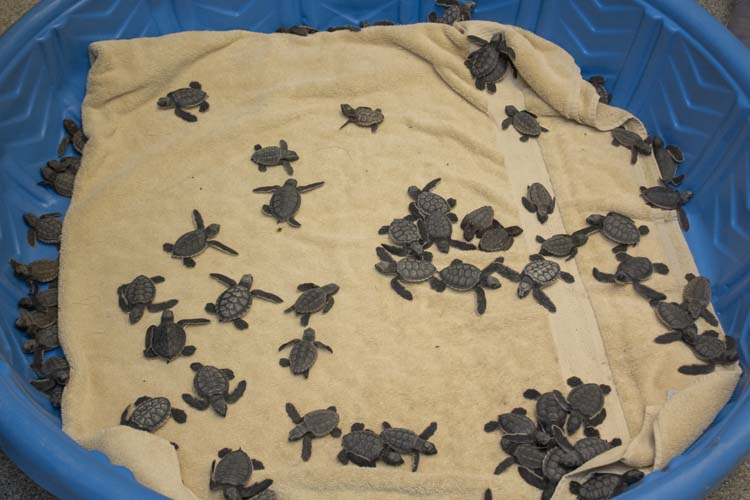
About 70 percent of the marked turtle nests in Indian River County were washed away by Irma’s high tides and pounding surf, but Kendra Cope, the county’s turtle education expert, says the turtles will rebound.
“In my eyes our beaches fared pretty well and so did our turtles,” Cope said. “We will continue to see new nests until the end of October. It has been a record year for our Green turtles, with over 2,300 nests, and a record-breaking number overall, with over 8,000 nests this year.”
“Indian River County beaches fared better than expected,” agreed County Coastal Engineer James Gray, who on Monday afternoon was finalizing a beach erosion damage assessment for the Board of County Commissioners.
“In general, moderate dune erosion and beach profile lowering was observed. The greatest impacts are between Turtle Trail Beach Park and Humiston Beach Park, and in South County near Porpoise Point.”
Gray added that Hurricane Irma erosion compounded damage done by Hurricane Matthew last October and “increased the potential for additional beach and dune impacts from future storms.
“We will be working with the state and federal agencies to document this erosion in the event funding for beach repair becomes available,” he said.
“Jaycee Park lost sand that will cost about $130,000 to repair and replace,” said Vero Beach Public Works Director Monte Falls, “but we didn’t lose any parking – the water didn’t get under the paving this time – as it did with Matthew.”
Individual home and business owners faced with precarious shorelines who don’t want to wait for months until the county can muster permits and funding to dump sand on beaches can get emergency permits for small-scale repairs.
“The State of Florida has issued an Emergency Final Order which allows local governments to issue emergency fill permits to address dune erosion from Hurricane Irma,” Gray said.
There are no fees for these permits, which can be requested through Gray’s department, the Indian River County Coastal Engineering Division.
In Indian River Shores, Town Manager Robbie Stabe said the major infrastructure damage was to the public beach access at the end of Beachcomber Lane. “We lost the staircase off the newly repaired dune crossover and between 200 and 400 cubic yards of sand in that location.”
Stabe said the sand loss created a 6- to 8-foot escarpment. He said the Town’s insurance should pay for repairing the staircase.
“I have heard some private developments have already contacted James [Gray] to get emergency sand replenishing permits. I got one for the Town Friday in case no-one else does so we can … [do repairs that will enable] the Public Safety Department to have access onto the beach in case of an emergency.”
Mother Nature also put her own creatures in peril as Irma swiped Indian River County near the height of green turtle nesting season.
“There have been a number of live and dead hatchlings found these last few days,” according to Cope. But, she added, “over 150 nests made it through the storm and 10 new nests have been laid since Sept. 12.”
Another bright side of the story for many of the turtles is that volunteers, environmentalists and agency employees were able to rescue more than 1,500 hatchlings called “washbacks” from Indian River and Brevard counties and get them into good hands at the Brevard Zoo.
Zoo personnel examined and cared for the baby turtles in tanks and plastic swimming pools for several days before transporting them to South Florida on Thursday. They did not release them in Brevard and Indian River where they were found because of Hurricane Jose churning up surf and rip currents along the coast.
“Sea turtles have evolved around storms and have many adaptations to overcome this challenge,” Cope said. “They lay four to six nests per season so they don’t ‘put all their eggs in one basket,’ so to speak. Green turtles also nest higher on the beach to avoid storm damage since they nest closer to the peak of hurricane season.”
If anyone comes across more washouts as other storms make waves, Cope said they should call the Florida Fish and Wildlife Conservation Commission. “If dead, they will give permission to bury it by dune; if alive, they will direct those folks to the nearest drop box. We have a hatchling drop box in Indian River County located at the Shores Public Safety office.”
Cope said people should not move or touch turtles without permission from FWC or from permitted personnel, because the animals are protected by law from human interference.



